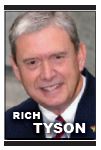By Richard Tyson
The first anniversary of the passing of one of the most extraordinary business gurus of the past century is in just a few weeks. Most notably, Clayton Christensen developed the theory of “disruptive innovation,” which he introduced in his 1997 book, The Innovator’s Dilemma. He has received high praise throughout the world for his insights and ideas. The Economist magazine has called him “the most influential management thinker of his time.”
As important as his work was in the realms of corporate strategy and business management, I believe his insights for living a fulfilling and worthwhile life transcend every other recognition he received.
As a prolific thinker and writer, Christensen penned several best-selling books. One that is often overlooked is what I deem to be his most important: How Will You Measure Your Life? He co-authored it with two colleagues, James Allworth and Karen Dillon. Among the volumes that bear Christensen’s name, it is this one that, in my opinion, is his most significant contribution and legacy.
When it was published in 2012, the title of the book alone caused me deep reflection. Those thoughts merged with insights from author David Brooks, who introduced the idea of “resume virtues” versus “eulogy virtues” in his book The Road to Character. Brooks states, “The resume virtues are the ones you list on your resume, the skills that you bring to the job market and that contribute to external success. The eulogy virtues are deeper. They’re the virtues that get talked about at your funeral, the ones that exist at the core of your being — whether you are kind, brave, honest or faithful; what kind of relationships you formed.”
The question “how will you measure your life?” leads us to consider both our resume and eulogy virtues, and perhaps the tradeoffs we might make in deciding how, exactly, we want to measure our lives.
In their book, Christensen and his co-authors pose three additional simple but deeply important questions that each of us should ponder:
• How can I be sure that I will be successful and happy in my career?
• How can I be sure that my relationships with my spouse, my children and my extended family and close friends become an enduring source of happiness?
• How can I be sure that I will live a life of integrity — and stay out of jail?
I love the incisiveness of these questions. They don’t mince words. If we give them more than casual responses, they remind us that, for each of us, life is a canvas upon which we each portray ourselves. We must each make the decisions that will paint a picture of a fulfilling and happy life on our own personal terms.
Christensen recognized some common and important themes for our consideration: career success; strong, caring and devoted relationships; and consistent and continuous integrity in our actions. His cautionary “stay out of jail” qualifier, while giving a hint to his native sense of humor, nevertheless reminds us of the counterfeits so prevalent in our pursuits of worldly success.
That said, he would be the last one to suggest that the world of business is inherently evil. He was the epitome of a man who recognized and utilized viable principles of business effectiveness and efficiency governed by deep principles of integrity, caring and compassion.
In my opinion, the principles in How Will You Measure Your Life? are the most important of the disruptive innovations that Clayton Christensen shared in his stellar career. They disrupt, in a very positive way, our headlong pursuit of resume virtues — and possibly even counterfeits to real success and happiness. They lead us to deeper consideration of our eulogy virtues.
I was privileged to have only a few conversations with Clayton Christensen. I know his closest friends simply called him Clay; I never got to know him well enough to be comfortable addressing him that casually. But, while I may have been a bit awed by his reputation, he treated me with kindness and respect from the moment I first approached him. He listened to my ideas and responded with both frankness and encouragement. For all of Christensen’s well-deserved accolades in the world of business, I can simply say his life must surely be measured as one of sincere kindness, service to others and fulfillment of his own purpose as he defined it.
I only wish he could have stayed with us longer.
Richard Tyson is the founder, principal owner and president of CEObuilder, which provides forums for consulting and coaching to executives in small businesses.








